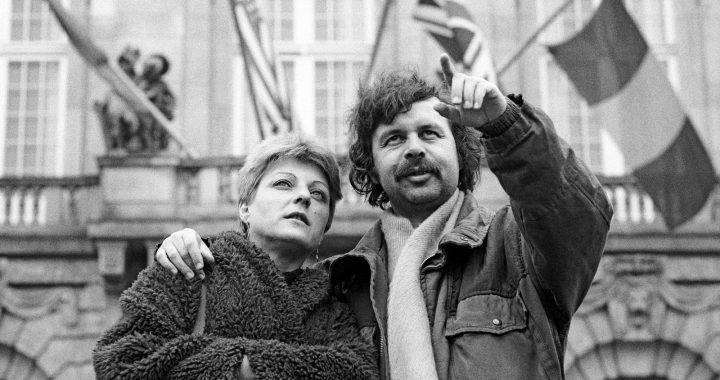Find a novel on your shelf that didn’t work for you. How would you have done it better?
It makes sense why this exercise appears in the repair chapter. Helping us to objectively make someone else’s book better for us might help us make our own books better for other people. Luckily, I have just the book to perform this task.
The last book I read that was totally not for me was actually a gift. Herta Muller, an Nobel Prize winning Romanian-German author, with her The Fox Was Ever the Hunter book. It was publishing in the early nineties, with the terrors of the Romanian Communist regime fresh in her mind, the wounds still scabby. So it’s a book about letting your skin scar over. Wherein the prose reminds me of Derek Walcott’s poetry. Jab-y, crafted, with strong vocabulary, and just enough leitmotif to carry you from one page to another, shaking your head at how brainwashed most characters were.
And yet I totally disliked the book.
My rule is to read a book at least to the halfway point. I know everyone has their own system (slug through anything, only read what you like, or get to the first 50 pages). But my system is to get halfway. Especially when it’s a gift. I’m so agreeable, I feel like I owe the other person the joy of knowing I enjoyed the book, or at least honestly tried.
So let me honestly say this book wasn’t for me. How would I have edited it? Here are three things that worked for me and three things that didn’t work so well.
. . .
- The setting is important, timely, and will forever be the subject of intense study. The 1980s for Romania were a brutal time, with the optimism of the regime deteriorating into the nightmare it always was. As the world danced to disco or post-punk in the 80s, Romanians had to report the days they were on their period. While everyone wore rainbows of neon colors, Romanians drove one model car. It was tough, culturally, spiritually, and people were waking up to it more and more every day. So when I discovered that this award winning author had tackled the months leading up to the Romanian revolution, I was hooked to the setting. As it turned out, Muller does capture the essence of this terrible time, as the characters fight through it, full of conflict, tension, and misery. If only more of the story’s action was as incredible as its setting.
- The general plot really gripped me. It’s the love triangle between a school teacher and two of her friends. But the problem is that one of them, maybe even the teacher–from what I gathered–might be an informer for an Romanian internal security cell. Love intrigues will always fascinate me. Especially semi lesbian, semi hetero love triangles. Pure juice. What also gets me are evil security organizations. CIA, Gestapo, KGB, all that horror is the same to me. Just dudes with different colored emblems tagged on their badges. So to have this intelligence organization slither a slippery tentacle into the plot’s love triangle only made things hotter. If only the plot on a micro level kept me reading as much as its did on the macro level.
- Probably the strongest element of this book were its quirks. There’s a barber who predicts who will disappear or die next based on how much hair he has cut — since he tells a little girl he keeps everyone’s hair in a hay bag behind his house. It’s horribly memorable. Or there’s a moment where the protagonist stares at a line of ants. It’s such a bizarre and powerful moment, I can’t help but remember it, definitely related to the theme of communism. Another example was how the principal of the school where the protagonist works at puts his hand down the top of her blouse, while questioning her. It was totally out of left field, and such a strange way to violate a teacher. A quirk, and something that will, unfortunately, remain with me as much as with the author. But everything in between? Unremarkable, I’m afraid.
That’s what worked: the setting, the macro plot, and the very, very strange moments. But, as mentioned above, those things are not enough. So what I would have done different is pretty much take what was working well and go further with them. But also, what could have been done different all together? Fix some of the errors going on.
- The setting was nice, but what do I have to compare to it? Our author doesn’t ever paint a portrait of a better life. What would have made more use of the setting is to paint the evil of the regime against the relief of 1920s and 1930s Romania, which I hear was pretty awesome. Why communism hurt was because of how world-class Romania used to be. So why not have the old people secretly remind everyone of that, while possibly losing their life in keeping alive the truth? Or, conversely, why not give the youth something to hope for? Pretty much every decade after the 80s in Romania got better and better. So why not contrast the bleak 80s with a vision (eventually a true vision) of the future? Which the youth could be secretly striving for, at least in their imaginations? And damn, if all that fails, why not go cheap and have a happy moment happen despite everything, a la Viktor Frankl, or Margret Atwood in Handmaid’s Tale. Even Gilead harbors surprising moments, like discovering there is a secret organization aiming to sabotage the evil regime, or a small scrawling in the jamb of the door, giving the narrator hope? Look, honestly, maybe Muller included these elements but they were either overshadowed by a tremendous evil regime, or she wasn’t interested in thematic chiaroscuro, or, worst, I just didn’t pay attention because of another problem.
- Since I said the macro plot really got me good, I have to admit that the micro totally bored me. On a line to line basis this book works more like a two dimensional image, than a three dimensional world. I am not sure how to explain it other than to say that the sentences were jumpy and scattered. When describing a picnic for example the narrator lists things, rather than flow from one object to the other. When narrating the scene of the principal’s abuse, there’s no exchange of interior against exterior, action and reaction. It’s just bam, bam, bam, this happened, that happened. I guess this is a pacing issue too? What I mean is the micro level of the plot is hard to follow. And I would have suggested that the author rewrite her book. Instead of inspiring the feeling of despair through jumping jab-y prose, why not allude to it, or smooth around it? Instead of:
A purse. A clump of cotton wool drops onto the ground. The man with the wounded thumb bends over to pick it up. The woman pulls a strand of hair behind he ear, she takes the cotton wool out of the hand with the wounded thumb. A sun flower seed and an ant are clinging to the cotton.
Maybe something like this:
The woman sets her purse down, staring at the man with the wounded thumb. He notices something, not just the purse, but something small and insignificant, drop onto the ground. A clump of cotton wool. Bending over to pick it up, the man with the wounded thumb shows it to her. She pulls a strand of hair behind her ear. It makes him smile, before the woman takes the cotton wool out of his hand with the wounded thumb. In the clump, they both realize, there is a sun flower seed and an ant, clinging to the cotton.
More flow, I suppose. Which could just be a style preference, I suppose. But the reader will notice I prefer a little more interior, a little more groove to my sentences. Not just, “He said, she said, he did, it was, blah blah.” Otherwise, I get reading fatigue, and this next problem happens . . .
3. To paraphrase a professor of mine, I feel like Muller banged her keys all at the same volume. When you read a sheet of music, you’ll notice instructions like “forte” or “allegro” or “crescendo” or “diminuendo.” They’re called dynamics, which relate to how loud you play, but also the speed, or anything that accentuates the simple black and white notes on the piece of paper. The problem, sometimes, is writers will bang all the keys at the same 4/4 or the same speed or volume. Look, if this is what Muller wanted, then by all means. The world of music needs Katy Petty’s quantize vocals as much as Anthony Braxton free-form jazz. Just as literature needs space for dynamic prose and monotone prose. But for me, in my humble opinion, the story of a love triangle, set in turbulent yet eerie 1980s Romania, would have greatly benefited from some dynamic prose. Because what ends up happening when you read The Fox was Ever the Hunter is that each sentence one after the other starts to blur in my imagination. I don’t remember what I read or how I felt when I read it, which is rare. I do remember those quirky moments in the story, because I would never have imagined something like that. But to call her prose “haunting,” like the Washington Post put it, or that the book “works like a prism, shattering and illuminating a world that is always watching” as the Atlantic put it, feels more like false advertising.
But that’s just me! I don’t have a Nobel Prize yet. And yet I would have done the story differently. Why? So more people around the world would read my story, learn the perils of totalitarianism, and be that much more prepared to fight against it when it makes its inevitable comeback.




